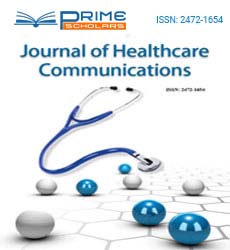Hayden Butow*
School of Psychology, The University of Sydney, Sydney, Australia
- *Corresponding Author:
- Hayden Butow
School of Psychology
The University of Sydney
Sydney
Australia
E-mail: butow_hayden.10@spud.au
Received Date: April 07, 2021; Accepted Date: April 22, 2021; Published Date: April 30, 2021
Citation: Butow H (2021) Handling of Fear and Uncertainty in COVID-19 Situation. J Health Commun Vol.6 No.S2:e003.
Description
Uncertainty about COVID-19 and its spread is an undeniable test for wellbeing communicators giving data about this condition. We basically have restricted insight and information, and not just about infectiousness and lethality. We realize too minimal about the transformation pace of the infection, if group insusceptibility will create and how much that will ensure us, regardless of whether an immunization will be proficient, and not the least, why the course of the illness appears to fluctuate so a lot, reliant upon age and fragility. Besides, the outcomes of a cultural lock down are likely terrible for some individuals. The path from uncertainty to frenzy might be brief.
To start with, it is essential to proclaim straightforwardly and genuinely what is known and what is obscure and to focus on what's relevant however much as could be expected. We should likewise recognize the transience of 'realities' as a work in progress. What information we have today will be refreshed and maybe adjusted given new proof identified with the illness and its administration. We additionally need to affirm precise wellsprings of this data. Given how quickly things are transforming, it is essential to be certain that when suggestions
change, this depends on new, beforehand obscure proof.
Second, data ought to be predictable and explicit. Regardless of whether we recognize that there is a lot of we don't have any
acquaintance with, it is significant not to stall out in dubiousness. Exploration on extreme sicknesses has shown that ailment uncertainty, a patient's failure to decide the importance of ailment related occasions, can be a consequence of equivocalness (clashing, deficient, or insufficient data); intricacy (hard to get data); and capriciousness (probability or hazard of future result of the illness). Hence, it is imperative to give data in clear, explicit, unambiguous, and predictable lay language. Past keeping the messages reliable and explicit, likewise the quantity of spokespersons ought to be restricted and predictable.
Conclusion
We propose that it is essential to exhibit capacity to settle on choices in a circumstance portrayed by uncertainty, with certainty (flagging capacity to have a sense of security in the circumstance) and genuineness (that the choice may refute). From a wellbeing correspondence viewpoint, a piece of this initiative may be to publically recognize and applaud those government officials, researchers, and medical services suppliers at the forefront attempting to take care of quick issues to assist all.
Fear is a characteristic reaction even with the pandemic. Fear doesn't disappear by being disregarded. Maybe the inverse, fear is simpler to deal with when it is recognized. Petersen has begat a term, "hopeful uneasiness", proposing that "residents should be adequately restless
to accept the exhortation from the specialists to heart and idealistic enough as to feel that their activities have an effect".

